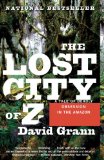Summary | Excerpt | Reviews | Beyond the Book | Readalikes | Genres & Themes | Author Bio

A Tale of Deadly Obsession in the Amazon
by David Grann1
WE SHALL RETURN
On a cold January day in 1925, a tall, distinguished gentleman hurried across the docks in Hoboken, New Jersey, toward the S.S. Vauban, a five-hundred-and-eleven-foot ocean liner bound for Rio de Janeiro. He was fifty-seven years old, and stood over six feet, his long arms corded with muscles.
Although his hair was thinning and his mustache was flecked with white, he was so fit that he could walk for days with little, if any, rest or nourishment. His nose was crooked like a boxer's, and there was something ferocious about his appearance, especially his eyes. They were set close together and peered out from under thick tufts of hair. No one, not even his family, seemed to agree on their color-some thought they were blue, others gray. Yet virtually everyone who encountered him was struck by their intensity: some called them "the eyes of a visionary." He had frequently been photographed in riding boots and wearing a Stetson, with a rifle slung over his shoulder, but even in a suit and a tie, and without his customary wild beard, he could be recognized by the crowds on the pier. He was Colonel Percy Harrison Fawcett, and his name was known throughout the world.
He was the last of the great Victorian explorers who ventured into uncharted realms with little more than a machete, a compass, and an almost divine sense of purpose. For nearly two decades, stories of his adventures had captivated the public's imagination: how he had survived in the South American wilderness without contact with the outside world; how he was ambushed by hostile tribesmen, many of whom had never before seen a white man; how he battled piranha, electric eels, jaguars, crocodiles, vampire bats, and anacondas, including one that almost crushed him; and how he emerged with maps of regions from which no previous expedition had returned. He was renowned as the "David Livingstone of the Amazon," and was believed to have such unrivaled powers of endurance that a few colleagues even claimed he was immune to death. An American explorer described him as "a man of indomitable will, infinite resource, fearless"; another said that he could "outwalk and outhike and outexplore anybody else." The London Geographical Journal, the pre-eminent publication in its field, observed in 1953 that "Fawcett marked the end of an age. One might almost call him the last of the individualist explorers. The day of the aeroplane, the radio, the organized and heavily financed modern expedition had not arrived. With him, it was the heroic story of a man against the forest."
In 1916, the Royal Geographical Society had awarded him, with the blessing of King George V, a gold medal "for his contributions to the mapping of South America." And every few years, when he emerged from the jungle, spidery thin and bedraggled, dozens of scientists and luminaries would pack into the Society's hall to hear him speak. Among them was Sir Arthur Conan Doyle, who was said to have drawn on Fawcett's experiences for his 1912 book The Lost World, in which explorers "disappear into the unknown" of South America and find, on a remote plateau, a land where dinosaurs have escaped extinction.
As Fawcett made his way to the gangplank that day in January, he eerily resembled one of the book's protagonists, Lord John Roxton:
Something there was of Napoleon III, something of Don Quixote, and yet again something which was the essence of the English country gentleman. He has a gentle voice and a quiet manner, but behind his twinkling blue eyes there lurks a capacity for furious wrath and implacable resolution, the more dangerous because they are held in leash.
None of Fawcett's previous expeditions compared with what he was about to do, and he could barely conceal his impatience, as he fell into line with the other passengers boarding the S.S. Vauban. The ship, advertised as "the finest in the world," was part of the Lamport & Holt elite "V" class. The Germans had sunk several of the company's ocean liners during the First World War, but this one had survived, with its black, salt-streaked hull and elegant white decks and striped funnel billowing smoke into the sky. Model T Fords shepherded passengers to the dock, where longshoremen helped cart luggage into the ship's hold. Many of the male passengers wore silk ties and bowler hats; women had on fur coats and feathered caps, as if they were attending a society event, which, in some ways, they were-the passenger lists of luxury ocean liners were chronicled in gossip columns and scoured by young girls searching for eligible bachelors.
Excerpted from The Lost City of Z by David Grann Copyright © 2009 by David Grann. Excerpted by permission of Doubleday, a division of Random House, Inc. All rights reserved. No part of this excerpt may be reproduced or reprinted without permission in writing from the publisher.




There is no worse robber than a bad book.
Click Here to find out who said this, as well as discovering other famous literary quotes!
Your guide toexceptional books
BookBrowse seeks out and recommends the best in contemporary fiction and nonfiction—books that not only engage and entertain but also deepen our understanding of ourselves and the world around us.